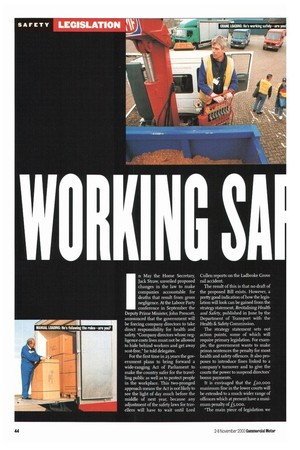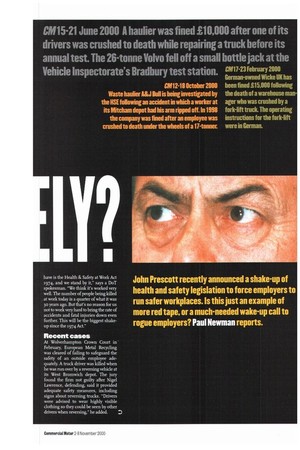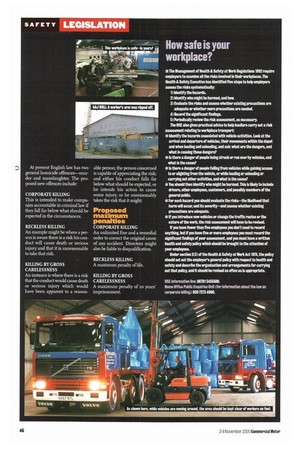NC SA
Page 46

Page 47

Page 48

If you've noticed an error in this article please click here to report it so we can fix it.
n May the Home Secretary, Jack Straw, unveiled proposed changes in the law to make companies accountable for deaths that result from gross negligence. At the Labour Party conference in September the Deputy Prime Minister, John Prescott, announced that the government will be forcing company directors to take direct responsibility for health and safety. -Company directors whose negligence costs lives must not be allowed to hide behind workers and get away scot-free," he told delegates.
For the first time in 25 years the government plans to bring forward a wide-ranging Act of Parliament to make the country safer for the travelling public as well as to protect people in the workplace. This two-pronged approach means the Act is not likely to see the light of day much before the middle of next year, because any adjustment of the safety laws for travellers will have to wait until Lord Cullen reports on the Ladbroke Grove rail accident.
The result of this is that no draft of the proposed Bill exists. However, a pretty good indication of how the legislation will look can be gained from the strategy statement, Revitalising Health and Safety, published in rune by the Department of Transport with the Health & Safety Commission.
The strategy statement sets out action points, some of which will require primary legislation. For example, the government wants to make prison sentences the penalty for most health and safety offences. It also proposes to introduce fines linked to a company's turnover and to give the courts the power to suspend directors' bonus payments.
It is envisaged that the £20,000 maximum fine in the lower courts will be extended to a much wider range of offences which at present have a maximum penalty of f5,000.
"The main piece of legislation we
have is the Health Er. Safety at Work Act 1974, and we stand by it," says a DoT spokesman. "We think it's worked very well. The number of people being killed at work today is a quarter of what it was 30 years ago. But that's no reason for us not to work very hard to bring the rate of accidents and fatal injuries down even further. This will be the biggest shakeup since the 1974 Act."
ROGOIlt OSUMI
At Wolverhampton Crown Court in February, European Metal Recycling was cleared of failing to safeguard the safety of an outside employee adequately. A truck driver was killed when he was run over by a reversing vehicle at its West Bromwich depot. The jury found the firm not guilty after Nigel Lawrence, defending, said it provided adequate safety measures, including signs about reversing trucks. "Drivers were advised to wear highly visible clothing so they could be seen by other drivers when reversing," he added. P
At present English law has two general homicide offences—murder and manslaughter. The proposed new offences include: CORPORATE KILLING
This is intended to make companies accountable in criminal law if they fall far below what should be expected in the circumstances.
RECKLESS KILLING
An example might be where a person is aware there is a risk his conduct will cause death or serious injury and that it is unreasonable to take that risk.
KILLING BY GROSS
CARELESSNESS
An instance is where there is a risk that the conduct would cause death or serious injury which would have been apparent to a reason able person; the person concerned is capable of appreciating the risk; and either his conduct falls far below what should be expected, or he intends his action to cause some injury, or he unreasonably takes the risk that it might.












































































































